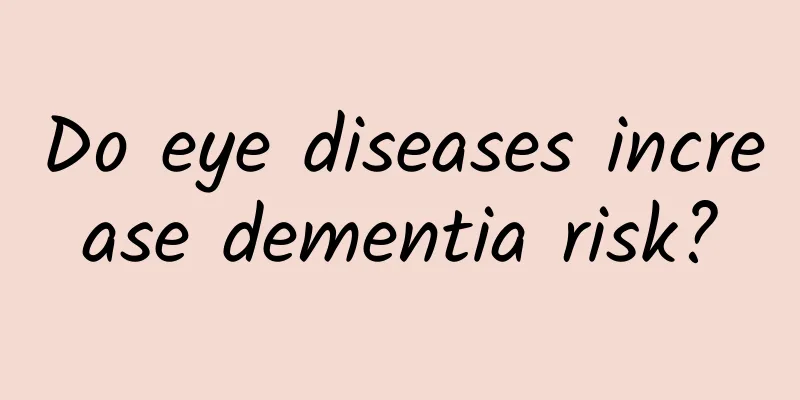Do eye diseases increase dementia risk?

|
This is the 4757th article of Da Yi Xiao Hu Recently, a large number of academic articles have revealed that eye diseases increase the risk of dementia? Is this conclusion reliable? How are eye diseases related to dementia? Certain eye conditions, including age-related macular degeneration (AMD), cataracts and diabetes-related eye disease, may be associated with an increased risk of dementia, suggests a study published in the British Journal of Ophthalmology. The observational study included more than 12,300 participants aged 55 to 73, some of whom had been diagnosed with AMD, cataracts, diabetes-related eye disease, or glaucoma. Initial evaluations were conducted between 2006 and 2010, with follow-up evaluations conducted regularly until 2021. During the study, 2,300 participants developed dementia. According to the research, the results are as follows:
Although glaucoma was not directly linked to an increased risk of Alzheimer's disease, the study did find a correlation between glaucoma and vascular dementia, a type of dementia that often develops after a stroke. The researchers also found that people who were diagnosed with multiple eye conditions, as well as those who had eye conditions in addition to systemic illnesses such as diabetes, stroke or a history of heart disease, had a higher risk of developing dementia. Coincidentally, another study published in the Journal of the American Medical Association (JAMA) Ophthalmology showed that vision loss in the elderly over 71 may be related to dementia. Researchers at the University of Michigan analyzed data from nearly 3,000 American citizens over the age of 71. This larger study tested the participants' vision and recorded their scores for near vision, distance vision, and their ability to distinguish objects against different backgrounds. They found that participants with vision loss were more likely to develop dementia than those without vision problems. Vision problems, and sometimes even vision loss, can be one of the first symptoms of dementia, and according to research, dementia progresses faster when the visual pathways are not stimulated. Dementia often causes vision problems that can affect daily life, including:
If these behaviors are noticed, an eye exam can help determine if an eye condition is the root of these difficulties. Therefore, vision management is a way to reduce the risk of dementia. Author: Zhongshan Hospital Affiliated to Fudan University Shen Jun, deputy chief nurse Gu WenbingAttending Physician |
<<: What happened to those people who always wore false eyelashes?
>>: How can elderly friends stay away from influenza?
Recommend
Fever in late pregnancy
The physical health of pregnant women has always ...
5-year survival rate of stage III ovarian cancer
Ovarian cancer is a malignant tumor in the female...
What positions should girls use for the first time?
The first time a girl has sex is of great signifi...
When should I start using essence? How should I use essence correctly?
Women in their 25s often have dull complexions an...
How to remove stretch marks most effectively
Speaking of stretch marks, many postpartum mother...
What happened if my period was delayed for a week?
Menstruation is a very important thing for women....
Can I practice yoga during menstruation?
Yoga has a very good effect on body shape and wei...
How many months is it good for pregnant women to have a checkup?
Pregnant women need to have more frequent checkup...
What causes endometritis?
Endometritis is a common gynecological disease. T...
What is so special about ants? What do ants do in autumn?
Ants are also known as ants, black horses, insect...
What to eat when women have low testosterone
Estrogen is of great significance to women's ...
Can I have sex on the fifth day of my period?
Generally speaking, it is not recommended to have...
8 facial features that reveal whether your marriage is going well
Forehead is too bald A woman with a bald forehead...
How many months is it appropriate to go to work during pregnancy?
Nowadays, many families attach great importance t...
What should I pay attention to when I have a miscarriage at 8 weeks of pregnancy?
In life, many women do not have enough knowledge ...









